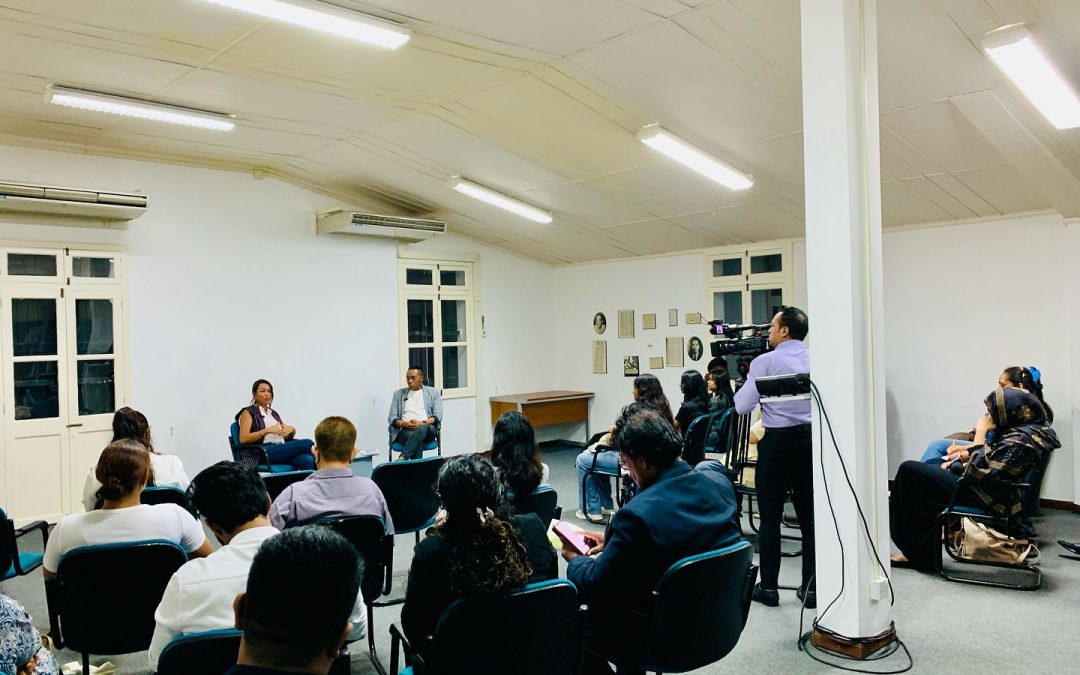By Enock Sithole
The Mauritius Media Trust, a long-standing institution dedicated to advancing journalism in the island nation, has taken a significant step toward becoming a regional hub for climate change and science journalism in the Indian Ocean region.
The Media Trust Mauritius has expanded its scope beyond national borders, offering specialised training that addresses the urgent challenges of misinformation, environmental reporting and the complex science behind climate change.
Established in 1987, the Trust has long served as the main body responsible for training journalists in Mauritius. It brings together members of the local press, as well as representatives from the government, including the Ministry of Finance and the Prime Minister’s Office.
Although small in size and resources, the Trust has played a pivotal role in nurturing journalistic skills across a range of fields.
“In a small country like Mauritius, journalists cannot specialise in a single beat,” explained Shehzad Joomun, Secretary, Media Trust Mauritius. “You have to report on everything, from politics to science, and that makes it even more important to strengthen general knowledge and technical skills.”
When Joomun took over as secretary in 2023, he brought a new vision shaped by his background as a science journalist and a fellow of the Southern African Development Community (SADC) Science Journalists network. Recognising the growing threat of disinformation, particularly around scientific issues, he began steering the Trust toward more focused programmes on science and environmental journalism.
This shift gained momentum earlier in 2025 when the Trust hosted its first regional workshop on climate change and disinformation, organised in partnership with UNESCO, the Indian Ocean Commission, and local and international experts. The three-day workshop, held in Mauritius, gathered journalists from Madagascar, Seychelles, Djibouti, Comoros and the Rodrigues island.
According to Joomun, the event was a milestone for both Mauritius and the region. “It was the first time that a media organisation in the Indian Ocean hosted such a regional workshop,” he said. “The journalists shared how their countries are affected differently by climate change, yet they realised how interconnected their challenges are.”
The discussions ranged from the science of climate change to the tools of fact-checking and countering misinformation. Participants explored issues such as coastal erosion, flash floods, mangrove planting, and coral restoration, topics critical to the survival of small island developing states.
Building a community of climate reporters
One of the workshop’s most valuable outcomes was the formation of a regional network of journalists committed to covering climate and environmental issues. This network continues to exchange information and stories via WhatsApp and online meetings. “We didn’t just train journalists,” Joomun said. “We built a community that’s still sharing stories, ideas and solutions across borders.”
The initiative’s success caught the attention of UNESCO, which later proposed that the Mauritius Media Trust serve as a regional training hub for journalists in the Indian Ocean region. The Trust has since received funding from UNESCO’s International Programme for the Development of Communication (IPDC) to continue training and collaboration efforts.
With this support, MMT will roll out a one-year hybrid training programme, starting in late October or November, that combines online learning, expert lectures and in-person field visits. The next in-person session is scheduled for July or September 2026 in Mauritius, where participants will explore sites directly affected by climate change.
Joomun believes that journalism training should not be confined to classrooms. The Trust’s approach includes on-site visits to environmentally sensitive areas and collaborations with local partners such as the Mauritian Wildlife Foundation and which funds coral farming and restoration projects in the southeastern part of the island.
Participants will visit Ramsar sites—wetlands of international importance—and bird sanctuaries threatened by rising sea levels and the loss of feeding grounds. “When journalists see the effects of climate change with their own eyes, their storytelling becomes more powerful and grounded,” Joomun said.
The programme will also be open to journalism students and early-career reporters, aiming to nurture a new generation of media professionals who can explain complex science topics in simple, engaging ways. “Science journalism is not just for scientists,” Joomun emphasised. “It’s about making science understandable and relevant to the public.”
Looking ahead, the Trust plans to expand its partnerships beyond Mauritius. The Trust is in talks with the Science Journalists’ Association of South Africa, Stellenbosch University and other institutions to bring in guest speakers and trainers. These collaborations will strengthen links between media professionals in Africa and the Indian Ocean islands.
Joomun sees this as part of a broader vision: “We’re laying the foundations for something much bigger, a strong, interconnected community of science and climate journalists across Africa and the Indian Ocean. This is vital for small island states like ours, which are on the frontline of climate change.”
For Joomun, the work is also deeply personal. As a member of the World Federation of Science Journalists, he helped ensure that small island developing states will have a voice at the upcoming World Conference of Science Journalists to be held in Tshwane, South Africa, in December. “We must tell our own stories,” he said. “The big news agencies like Reuters and AFP don’t always cover what’s happening in our islands. Journalists from our region must share their experiences and solutions.”
The initiative by the Media Trust comes at a time when accurate climate reporting is more crucial than ever. Misinformation continues to cloud public understanding of global warming and environmental science. By investing in capacity building and regional collaboration, the Trust is not only empowering journalists but also contributing to better-informed citizens and decision-makers.
“Journalists should not be passive observers,” Joomun concluded. “We have the power to inspire change, to connect communities and to shape how our societies respond to climate change. That’s what this project is all about.”

